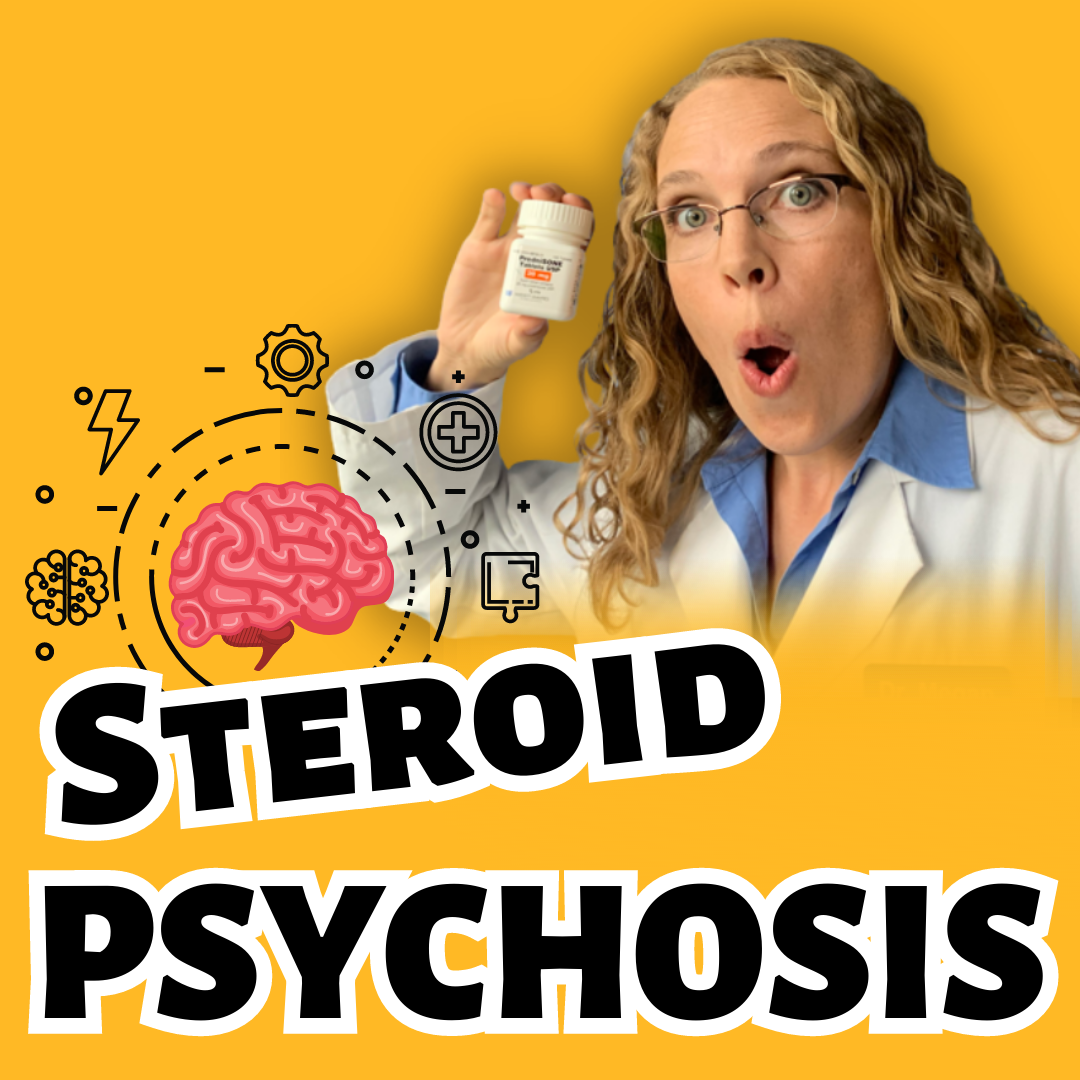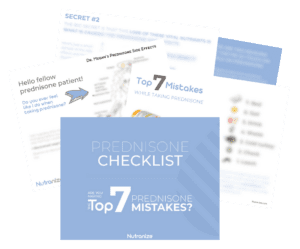Steroid Psychosis: Can Prednisone Do This?

A wife called me and said, “My husband is suffering immensely and he went off Prednisone probably 5 days ago. And we just are not sure what to do, or you don’t know if we need to go back on the drug. If we need to go to the hospital.”
Then I found out that he was suffering symptoms of steroid psychosis.
This rare but devastating side effect of prednisone caused an otherwise normal man to be non-functional. He hadn’t slept more than 6-7 hours in the last 10 days.
May is Mental Health Awareness Month and what prednisone does to our mental health is one of the most shocking surprises people on prednisone suffer.
I don’t want you to be surprised or suffer needlessly.
Find out what steroid psychosis is and I recommended to him.
Watch Now!
What are the Symptoms of Steroid Psychosis?
The symptoms of steroid psychosis can range from mild, subtle mood changes to full blown psychosis.
The Figure 1 below,

This chart shows that the subtle mood changes include anxiety, distractibility, fear, indifference, insomnia, irritability, lethargy, labile mood, and restlessness. Next, memory deficits can include a loss of verbal memory, delirium, and even dementia. Finally, psychosis includes symptoms of mania, depression, psychotic disorder, and delirium.
How to diagnose Psychosis from Prednisone?
The diagnosis code for steroid-induced psychosis, or psychosis from prednisone in the DSM-5 is 2023 ICD-10-CM Diagnosis Code F19. 251: Other psychoactive substance dependence with psychoactive substance-induced psychotic disorder with hallucinations.
- First, the patient must have at least delusions or hallucinations after exposure to a medication capable of producing these symptoms.
- The disturbance cannot be better explained by a non–medication-induced psychotic disorder, and it does not occur exclusively during the course of a delirium.
- Finally, it must cause clinically significant distress or functional impairment
Thus it is more of a diagnosis of exclusion after ruling out all other causes, such as organic psychiatric disorders, drug use, intoxication, metabolic disturbances, infections, and neoplasms.
What are the Complications of Prednisone-Induced Psychosis?
According to one study, the complications of prednisone psychosis include “clinically significant anxiety and sleep disturbances to severe mood symptoms such as depression, hypomania, mania and psychotic disorders, cognitive impairment, delirium, and dementia.”
When does Steroid Psychosis happen?
Steroid psychosis often happens after just a few doses. The average time is about 3-4 days after the first dose of steroids. However, it can happen anytime after starting treatment and even after stopping prednisone.
How long does Steroid Psychosis last? How long does it take to recover from Steroid Psychosis?
Once the prednisone or other corticosteroid is stopped, it takes time to recover. The depressive symptoms can last for about 4 more weeks. The mania symptoms for another 3 weeks after steroid stopping. Usually, delirium recovers quicker, within a few days. About 50% of people who get corticosteroid-related psychosis start improving in 4 days. The other 50% usually improve within 2 weeks.
One study shared 3 case reports. The first was a 77-year-old man, and his psychotic symptoms completely disappeared on day 16. Next, a 21-year-old woman stopped taking prednisolone on day 4 of treatment and then was free of symptoms on day 5. Finally, a 65-year-old woman was prescribed antipsychotics on day 4 and when the dose was increased, by day 14, her delusions and paranoia “completely dissolved.” She continued taking antipsychotics after going home.
How to Treat Steroid Psychosis?
First, you need to see your doctor and tell them exactly what you’re suffering. Next, this is what the studies recommend:
- Taper or discontinue: most effective
- Additional antipsychotic:
a. 1st Generation Antipsychotic: Haloperidol
b. 2nd Generation Antipsychotic: Risperidone, olanzapine, quetiapine. - Lithium for mania
- Antidepressants: SSRIs for depression
References:
- Lesko A, Kalafat N, Afreen M. Four Case Reports of Acute Psychosis Secondary to Low Doses of Prednisone/Prednisolone. Cureus. 2021 Dec 31;13(12):e20853. doi: 10.7759/cureus.20853. PMID: 35141097; PMCID: PMC8801186.
- Gagliardi JP, Muzyk AJ, Holt S When steroids cause psychosis. Rheumatologist 2010.
- Zagaria, MA. Systemic Corticosteroid-Associated Psychiatric Adverse Effects. US Pharm. 2016;41(7):16-18.
- Lewis DA, Smith RE. Steroid-induced psychiatric syndromes. A report of 14 cases and a review of the literature. J Affect Disord. 1983;5:319-332.
- Hall R, Popkin M, Stickney S, et al. Presentation of the steroid psychoses. J Nerv Ment Dis. 1979;167:229-236.
Related Posts
-
Prednisone Psychotic Symptom Recovery – Robert
Prednisone Warrior Robert shares his tale of suffering psychotic side effects after taking high dose... -
Steroids Stole My Summer – Importance of Drug Monitoring
Prednisone has been prescribed by medical professionals to ease suffering and save the lives of... -
Am I Crazy? The Psychiatric Side Effects of Prednisone
Psychiatric Side Effects of Prednisone Prednisone not only affects your body, but it also affects...


